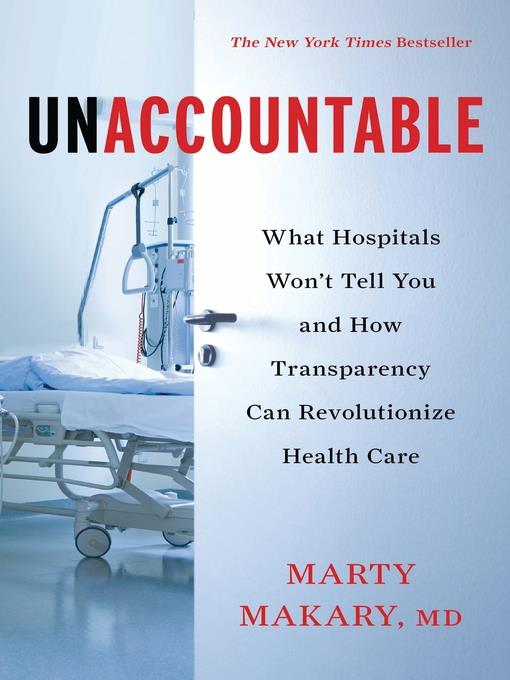
Unaccountable
What Hospitals Won't Tell You and How Transparency Can Revolutionize Health Care
آنچه بیمارستانها به شما نمیگویند و اینکه شفافیت چگونه میتواند باعث تحول در مراقبتهای بهداشتی شود
کتاب های مرتبط
- اطلاعات
- نقد و بررسی
- دیدگاه کاربران
نقد و بررسی

June 11, 2012
We demand accountability from Wall Street and the White House, yet are shockingly reluctant to demand it from our hospitals, laments Makary, a Johns Hopkins surgeon and professor of health policy, in this urgent call for doctors and hospital administrators to ditch their dangerous culture of secrecy. Lifting the veil on the existing wealth of data from hundreds of hospitals’ rates of infections, surgical complications, and other negative patient outcomes, he argues that making those statistics public would force low performers to fix their problems and compete far more effectively rather than waste money on ad campaigns. Moreover, every patient should routinely be able to see a hospital’s re-admission rate; its surgical or treatment complication rates; its “never happen” events, like surgery on the wrong side of a patient; its safety-survey scores from its own workers; its volume of operations and treatments; and its programs to streamline access to patient records. For a noteworthy example, Makary dishes that one patient boasted that his surgeon operated on President Reagan—but had no clue Reagan suffered from complications caused by an improperly placed central-line for IV fluids and medication. This thought-provoking guide from a leader in the field is a must-read for M.D.s, and an eye-opener for the rest of us. Agent:Glen Hartley, Writer’s Representatives LLC.

July 1, 2012
A searing insider's look at what really goes on behind the scenes at major hospitals and how implementing simple steps toward transparency can empower patients and dramatically improve the culture and safety of health care. Makary, a cancer surgeon and professor of health policy at the Johns Hopkins Bloomberg School of Public Health, states in no uncertain terms that medical errors are a nationwide problem affecting thousands of unwitting patients. Often, hospital management operates on corporate models, pursuing profit over quality, resulting in overprescribed procedures and rushed or sloppy surgeries. Despite efforts to make medical care safer, a quarter of all patients in America are harmed by medical mistakes, a statistic that persists largely due to the "code of silence" that exists among doctors. The author argues that transparency, both within hospital personnel and between hospitals and the public, has the potential to radically decrease instances of preventable errors and to eliminate incompetent doctors. For example, making doctor's notes part of a shareable database of medical records increases accountability and allows patients to make more informed decisions about their health. Similarly, requiring hospitals to tally and share mortality rates for standard surgeries leads to quick improvements in practices. When a hospital's reputation is on the line, and potential patient dollars are at stake, the impetus to improve becomes significant. When New York state tried this tactic using heart-surgery death rates, the result was "big, broad improvements in mortality, statewide. With each passing year of public reporting, the state's average death rate went down." Providing an abundance of hospital-reported data alongside eye-opening anecdotes, Makary gives practical tips on how to navigate the system and receive quality care. However, he insists that without dramatic--though easily implemented--changes, little will improve. A galvanizing book full of shocking truths about the current state of health care.
COPYRIGHT(2012) Kirkus Reviews, ALL RIGHTS RESERVED.

April 15, 2012
The Johns Hopkins surgeon who developed the checklist that inspired Atul Gawande's best-selling The Checklist Manifesto, Makary here challenges the lack of transparency in health care, which leaves patients ignorant and error rates uncomfortably high despite efforts to curb them.
Copyright 2012 Library Journal, LLC Used with permission.

























دیدگاه کاربران